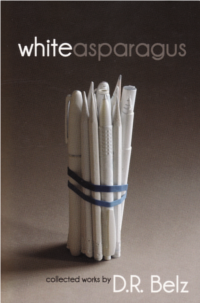Fall 2010
Table of Contents - Vol. VI, No. 3
Dan Cuddy
D.R. Belz,
White Asparagus, Apprentice House, 2010, ISBN 978-1-934074-53-4 pages 224, $18.95
The cover of D.R.Belz’s book “White Asparagus” appears to have a bunch of White Asparagus displayed. Look again. It is not asparagus. The contents of the book inside are like that picture: the creation of art with the ordinary things at hand arranged with a wondrous imagination.
The book is divided into three sections: Essays, Poetry, Fiction. The essays are filled with wit and humor, and always observation of human and cultural foibles. Belz gives an astrological forecast, ethnic recipes, discusses corporate trademarks that have become common language in American life, such as Plexiglas and Kleenex, 21st century etiquette, and more. Here is an example, talking of etiquette, of both his observation, his wit and the easy-to-read writing style which makes his work so inviting:
“How do you do?” has been replaced by “What do you do?” followed close on by “What
kind of hollow-point ammo does your handgun take?’
The poetry is clean and crisp. The surface of it is easy to read. Below that surface there is deep emotional depth. As good poetry does, Belz’s poems explode the unsayable into our consciousness. Belz tackles a variety of subjects in his poetry. There is the erotic nature poem “Gaia” ,which is the first poem. Look at this stanza, quite sexual in expression without in the least being salacious.
Empty sides in, they slide in her,
Filling and sipping her ripe ooze,
Drunk on the fecundity.
The second poem, “Faces”, confronts the strange psychology of Arab terrorists who disguise evil with the mantra of praise for the savage theology they embrace, but it is the human maniacal pride that sounds like schoolyard insecurity and consequent bullying more than an adult in touch with the Divine that comes to light---along with the philosophical irony of it all...
“I am a man of the desert.
No one laughs at my beard.”
The cheek of that,
And of when we are told,
Finally, that God is great.
Incidentally, look at the phrase “the cheek of that”. The stanza turns on the double meaning of that.
The poems that follow, for the most part, have more familiar emotional and situational settings. “Washing An Apple for my Daughter” is an unsentimental expression of a father’s love.
Water over the skin,
I carefully pare an apple down,
Down, not knowing how to tell her what’s ahead.
Lucifer-like, do I make her world too sweet
As I hand her the fruit,
Sure that everything depends on her
Her tiny, perfect “thank you” ?
If there is any fault with this book, it is that there are too few poems. Belz writes poems that can be read again and again. The electricity of both his emotional discoveries and his verbal expression, so precise, is an ever ready battery that does not fail to deliver.
As good as the poems are the short stories may be even a greater accomplishment. There is that characteristic mixture of observation and imagination that give Belz’s work a memorable reality. “The Fabulist” and “White Asparagus” illustrate the author’s ability to create characters. The first is an interweaving of three points of view, Hal, Trish and Devon’s about a three-day mountain trek to visit Devon’s dying grandfather who Devon needs to see and wants, like a child, to hear three different campfire fables. A touch of nostalgia that need? Perhaps something deeper. The story itself tells three stories in the one. The boys are both Trish’s ex-boyfriends, and rivals in athletic competition at school. This provides an extra level of tension in the story.
cross country team for those past three years. I still remember chasing the white kerchief
she had tied around Devon’s bicep just before he tore out in front of us in our last home
meet against Salisbury and Hopkins. Through my salt-burning eyes, I watched the kerchief
bob up and down, like the tail of some mythical stag I had to catch.
“White Asparagus” has such a super opening line: What makes a man want to kill his wife? Perhaps that line conjures all kinds of homicidal maniacs but the story is about ordinary people like the kind we meet everyday, some with distinguishing accents, some with eccentricities, others just solid aspiring working people. The story is set in Roland Park, a semi-moneyed and genteel section of Baltimore City----the same neighborhood that many of Anne Tyler’s novels use. The narrator has inherited a neighborhood hardware store from his father, but, though he operates it, he is eventually seeking to liquidate it. Who is the murderer and the victim? I’ll leave such details to future readers.
“Tidings” , “The Perfect Pancake”, “There Angels Dance” are three of this reader’s favorites. Each has dramatic tension and illuminates the human character as the people in the stories either work their way through circumstances or discover a situation they never imagined. All 13 of the stories are interesting and masterfully written.
© Dan Cuddy

